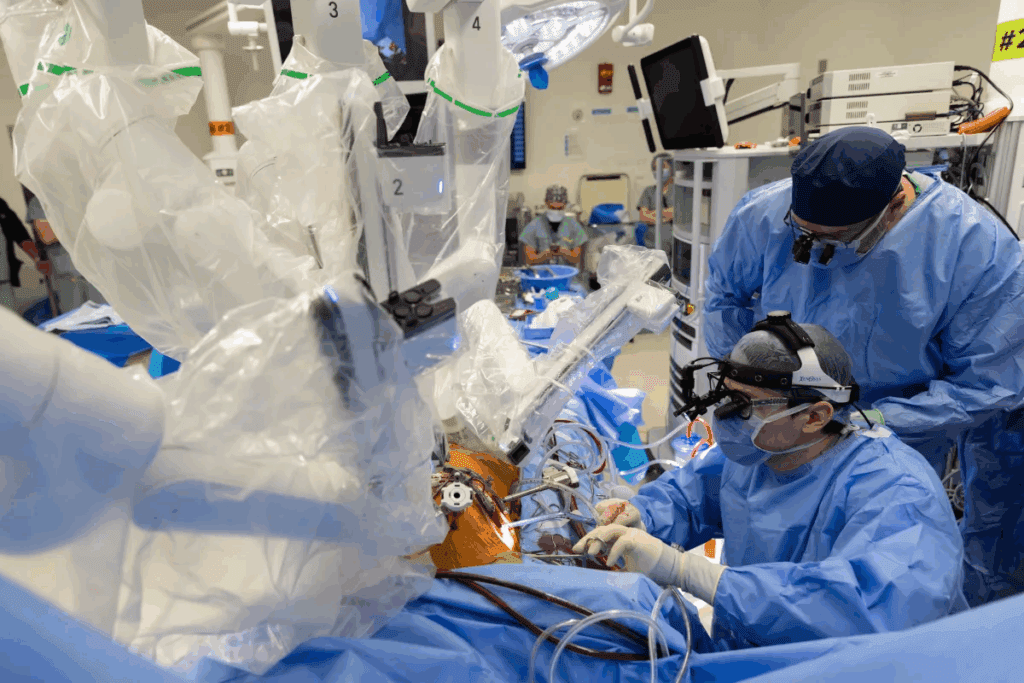Last Updated on November 27, 2025 by Bilal Hasdemir

The cost of robotic heart surgery can be very high, ranging from $100,000 to $300,000 in the first year. This high cost has caught the attention of both patients and healthcare providers.
The advancements in robotic surgery have brought better results and shorter recovery times. This makes it a good choice for complex surgeries like heart surgery.
As the technology keeps getting better, it’s important to know the costs of robotic heart surgery. This knowledge is key for both patients and healthcare providers.

Cardiac surgery has changed a lot, starting with the first artificial heart in 1982. This event began a new chapter in heart care. Technology has kept improving to help patients more.
Oldly, heart surgeries needed big cuts and took a long time to heal. Now, minimally invasive techniques are used. They cause less harm, heal faster, and leave less scar.
These new methods have led to even better surgical ways.
Robotic systems have changed cardiac surgery a lot. They make surgeries more precise and flexible. This lets surgeons do complex tasks better.
Robotic coronary artery bypass surgery is one big benefit of this tech.
Now, cardiac surgery uses top-notch robotic tools. These tools help with minimally invasive heart bypass surgery and other tough heart surgeries. They give clear 3D views and tools that are easy to use, making surgeries more precise.
| Feature | Traditional Open-Heart Surgery | Robotic Cardiac Surgery |
| Incision Size | Large | Small |
| Recovery Time | Longer | Shorter |
| Precision | Limited by human hand | Enhanced by robotic systems |
Robotic heart surgery is changing the game for heart operations. It gives surgeons new tools to work with. With 3D visualization and precise instrumentation, they can do complex surgeries with more skill.
Surgeons control robotic arms from a special console. Their hand movements are translated into precise actions inside the body. This tech boosts enhanced dexterity and improved visualization, making tough surgeries easier.
The main parts of robotic systems are the surgeon’s console, a cart with robotic arms, and a 3D vision system. This setup helps surgeons do robotic heart bypass and robotic coronary bypass with less invasion.
The cost of robotic heart surgery comes from the cutting-edge tech. Developing and keeping these systems up, plus training surgeons, adds to the price. As tech gets better, we might see changes in cost and access to robotic surgery for heart procedures.

Robotic technology has changed heart surgery. It lets surgeons do complex tasks with more precision. Now, there are many robotic heart surgeries for different heart problems.
Robotic CABG is a new way to fix blocked heart arteries. It’s less invasive than old methods. This means patients can recover faster and costs are lower.
The robotic system helps surgeons work more accurately. This leads to better results for patients.
Robotic surgery fixes mitral valve problems. It’s more precise than traditional methods. This reduces risks and speeds up recovery.
Studies show robotic surgery causes less damage. Patients heal faster.
Robotic tech is used for more than CABG and mitral valve surgery.
ASD repair closes holes in the heart’s septum. Robotic surgery makes it less invasive. This means less scarring and quicker healing.
Removing heart tumors is delicate. Robotic surgery makes it precise. It lets surgeons remove tumors safely, without harming nearby tissue.
| Procedure | Description | Benefits |
| Robotic CABG | Bypass blocked coronary arteries | Reduced hospital stay, lower costs |
| Robotic Mitral Valve Repair/Replacement | Treat mitral valve disorders | Greater accuracy, less trauma, faster recovery |
| Atrial Septal Defect Repair | Close holes in the atrial septum | Minimally invasive, reduced scarring |
| Cardiac Tumor Removal | Remove tumors from the heart | Precise, preserves surrounding tissue |
Today, there are many robotic heart surgeries. This shows how far cardiac surgery has come. As tech gets better, we’ll see even more new ways to treat heart problems.
Knowing the cost of robotic heart surgery is key for patients. This surgery is less invasive, leading to quicker recovery and less pain. But, the price of this technology is a big factor to think about.
The cost of robotic heart surgery can change a lot. It usually falls between $18,726 and $35,580 per person. This range comes from different things like how complex the surgery is, the technology used, and the surgeon’s fees.
Hospital costs are a big part of the total price. How long you stay in the hospital affects these costs. Robotic surgery might mean a shorter stay, but the hospital costs are a big part of the bill.
Costs from the surgeon and anesthesiologist also add up. Surgeons who do robotic heart surgery might charge more because of their skill and the complexity of the surgery. Anesthesia costs can change based on the procedure and the anesthesiologist’s fees.
The price of robotic heart surgery can differ a lot from state to state. Things like the cost of living, hospital fees, and healthcare policies in each area play a role. It’s smart for patients to look into costs in their area or where they plan to have surgery for a better idea.
In summary, the cost of robotic heart surgery in the U.S. is influenced by many things. These include the cost of the procedure itself, hospital fees, surgeon and anesthesiologist fees, and how costs vary by region. Patients should talk to their healthcare providers to understand the costs for their specific surgery.
Many things affect the cost of robotic heart surgery. Knowing these can help patients and doctors guess the expenses better.
The cost of robotic heart surgery depends on the hospital’s location and reputation. Hospitals in big cities or known for heart care often charge more.
A top hospital for robotic surgery might have higher fees. This is because of the staff’s skill and the care’s quality.
The surgeon’s experience and skill are key to the surgery’s cost. Surgeons who do many robotic surgeries might charge more.
They can give better results, which can save money in the long run. This is because they might reduce complications and recovery time.
The cost also depends on how complex the heart problem is. More complex cases need more resources and time, raising costs.
The robotic system and equipment used in surgery also affect costs. Newer, advanced systems are pricier.
But, they can lead to better results and precision. This might make the extra cost worth it.
In summary, the cost of robotic heart surgery is influenced by many factors. These include the hospital’s reputation, the surgeon’s skill, the heart problem’s complexity, and the technology used.
Getting insurance for robotic heart surgery can be tricky. It depends on many factors. As this tech gets better, knowing about insurance is key for patients.
Medicare and Medicaid help a lot with the costs of robotic heart surgery. Medicare usually covers these surgeries if they’re needed. But, Medicaid’s coverage can change by state.
It’s important for patients to check their coverage with Medicare or Medicaid. Policies can change, and there might be special rules.
| Insurance Provider | Coverage for Robotic Heart Surgery | Out-of-Pocket Expenses |
| Medicare | Generally covers if medically necessary | Varies (deductibles, copays) |
| Medicaid | Varies by state | Often minimal to none |
| Private Insurance | Depends on the policy | Varies (deductibles, copays, coinsurance) |
Private insurance for robotic heart surgery is different for everyone. Some might cover it, while others might not. Or they might need extra approval.
Even with insurance, you might have to pay some money. This includes deductibles, copays, and coinsurance. The amount you’ll pay can change based on your insurance.
Getting insurance for robotic heart surgery needs careful planning. Work with your doctor to get all the right papers to the insurer.
Knowing about insurance helps make robotic heart surgery more affordable. It makes this life-changing tech easier to get.
When it comes to heart surgery, cost matters a lot. Patients need to look at the expenses of robotic and traditional methods. It’s key to compare these costs.
Robotic heart surgery costs more upfront. This is because of the robotic system’s price and the surgeon’s training. Robotic-assisted CABG can lead to shorter hospital stays and lower costs. This can help balance out the initial costs.
Robotic heart surgery means shorter hospital stays and less invasive procedures. This leads to lower recovery and rehabilitation costs. Patients often feel less pain and have fewer complications. This means they need less medical care during recovery.
The long-term savings of robotic heart surgery are big. It cuts down on hospital stays and complications. This results in significant cost savings over time.
Also, quicker recovery times mean patients can get back to work and daily activities faster. This adds to the economic benefits.
Looking at the total cost of care is important. It includes initial costs, recovery expenses, and long-term savings. Studies show robotic heart surgery might cost more at first. But, the overall cost can be similar to or even less than traditional surgery.
Robotic heart surgery is becoming more popular for heart procedures. It has high success rates and short recovery times. This new method has changed cardiac care, bringing many benefits to patients.
Research shows robotic heart surgery is as good as, or even better than, traditional surgery. The robots’ precision leads to more accurate repairs and fewer complications.
Robotic heart surgery means shorter hospital stays and quicker recoveries. Patients feel less pain and stress, healing faster and getting back to life sooner.
Robotic surgery is less invasive, lowering the risk of problems. The body suffers less trauma, and the surgery is more precise.
Patients are happier with robotic heart surgery. They experience less pain, less scarring, and a faster recovery. This greatly improves their life after surgery.
| Benefits | Robotic Heart Surgery | Traditional Heart Surgery |
| Success Rates | High | High |
| Hospital Stay | Reduced | Extended |
| Recovery Time | Quicker | Longer |
| Risk of Complications | Lower | Higher |
| Patient Satisfaction | Higher | Variable |
Real-life stories from patients who have had robotic heart surgery offer insights. They show how well the surgery works and how easy the recovery is. These stories also talk about the challenges patients face.
Many patients say robotic heart surgery is less painful and quicker to recover from than traditional surgery. For example, John Doe, a 55-year-old, was back to normal in just a few weeks. These testimonials highlight the surgery’s benefits.
Patients worry about the cost of robotic heart surgery and dealing with insurance. It’s important to understand these worries for those thinking about the surgery.
Patients who have gone through the surgery give advice on managing money. They recommend carefully checking insurance policies and looking for financial help. They also suggest making a budget for recovery costs.
By sharing their stories, patients help others prepare for the financial and recovery parts of robotic heart surgery. This makes the journey less scary.
Robotic heart surgery is a big step forward in heart care. It offers a less invasive option compared to traditional surgery. The cost can vary a lot, depending on where you are, the surgeon’s skill, and how complex your heart issue is.
Thinking about robotic heart surgery means looking at both sides. The good news is that it often leads to better outcomes and shorter hospital stays. It also means fewer complications. It’s also important to check what your insurance covers and what you might have to pay out of pocket.
Knowing how robotic heart surgery works and what affects its price can help you decide. Talking to skilled heart surgeons and checking your insurance can guide you. This way, you can choose the best care for your heart.
Robotic heart surgery is a new way to do heart operations. It uses a robotic system for complex procedures like fixing heart valves and bypassing blocked arteries.
The price of robotic heart surgery changes based on where you are and who you see. On average, it can cost between $50,000 and $150,000 in the U.S.
Yes, many insurances, including Medicare and Medicaid, cover robotic heart surgery. But, what you pay out of pocket can vary a lot.
Robotic heart surgery has many advantages. It uses smaller cuts, leads to less blood loss, and lowers the chance of complications. You might also spend less time in the hospital and recover faster than with traditional surgery.
Robotic heart surgery is very effective. Studies show it works as well as traditional surgery for many heart problems. Success rates can be as high as 95% or more.
Recovery from robotic heart surgery is usually quicker than traditional surgery. Most people can get back to normal in 2-6 weeks. This depends on your health and the surgery’s complexity.
The price of fixing a mitral valve with robotics can vary. It usually costs between $70,000 and $120,000 in the U.S., depending on the hospital and surgeon.
No, not all hospitals offer robotic CABG surgery. It needs special equipment and skilled surgeons. You might have to travel to a hospital that does it.
Robotic heart surgery might cost more upfront. But, it can lead to lower overall costs. This is because you might stay in the hospital less, have fewer complications, and recover faster.
Like any surgery, robotic heart surgery has risks. These include bleeding, infection, and problems with the robotic system. But, these risks are generally low. They can be kept down by choosing the right patient and surgeon.
Subscribe to our e-newsletter to stay informed about the latest innovations in the world of health and exclusive offers!